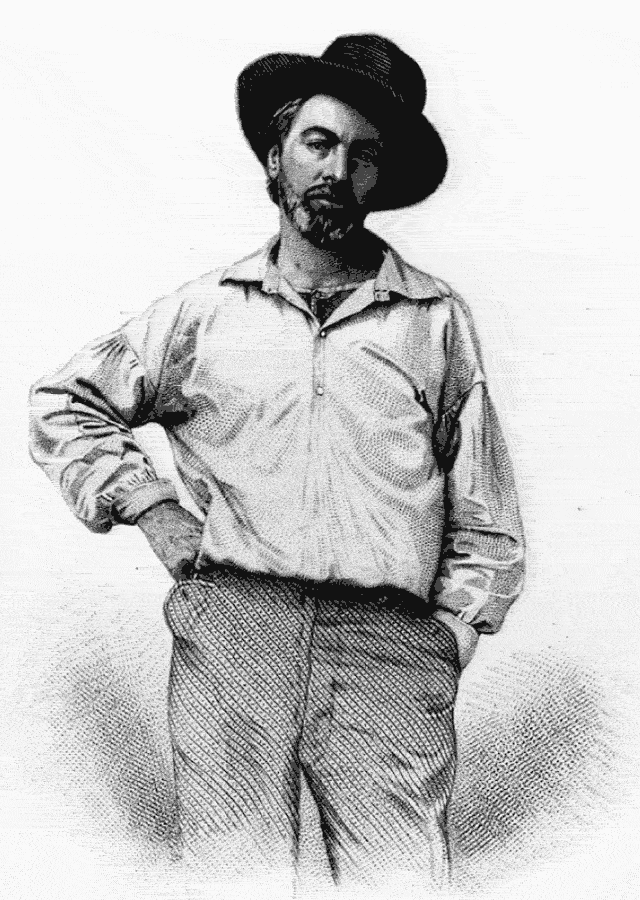Whitman and the American identity

Poetry is transformative, although usually intended on merely an individual level, altering each reader’s personally-held perspectives and world-view. Whitman’s “Song of Myself,” featured in his oft-recast anthology of poems Leaves of Grass, was aimed not at any singular reader but rather at American society and culture as a whole, hoping to reconcile the countless disagreements then dividing the nation and thereby prevent or curb the inevitable onset of the American Civil War. Such high aspirations for one’s work are traditionally not uncommon amongst poets, especially poets of Whitman’s stature, but I would argue that none before or since were quite as successful or memorable as “Song of Myself.” While its value may not have been fully appreciated at the time of its first publication, “Song of Myself” represents a turning point in both the collective and personal American identities, inspiring a new and expansive era of individualism which, to this day, differentiates the United States and its constituent cultures from every other society in the world.
Whitman’s is a song involving a transcendentalist glorification of self, a spiritual sentiment tied intrinsically to his undying fascination with the subtleties of the natural world. While, for many modern Americans, this proto-environmentalism might seem something of a polarizing issue, the transcendental themes in Whitman’s work might be relatable to those same particular readers, as spirituality, too, has long been an important element in qualifying the American identity. The United States is among the most Christian country on the planet—by percentages and numbers—and this somewhat-cursory note of an emphasis on spirituality infused with an individualist work ethic is only the beginning of the shared focuses of Whitman’s poetry and the American psyche.
At first glance, the poem’s self-centeredness and exuberant self-praise might seem somewhat conceited, as readers would be unaccustomed to reading epic poems glorifying exclusively the merits, imagined or actual, of their respective author. First, it should be understood that Whitman throughout “Song of Myself” adopts a literary persona which encapsulates the spirits of not only himself but also those of the collective American people, thereby making the narrator’s self-referential claims adaptable to any reader and to no readers in particular. In a poem aimed at reevaluating American values and restructuring the American identity, this decision was indeed a wise one. And yet, these lines can still be interpreted as directly referring to Walt Whitman himself without losing any of their intrinsic meaning. Whitman could be prototypical of the American populace, representing them and yet considering himself entirely separate from them. In this instance and interpretation of the poem, Whitman as both subject and narrator remains entirely relatable to readers, seeing as he would still be intended to represent the average American thinking man.
How appropriate is this approximation of the quintessential American identity as one obsessed with self? One could argue that self-centeredness—here not necessarily implying selfishness—is a foundational element in not only our democratic system of governance but also in our traditionally-capitalistic economic arrangement, each of these focusing almost entirely on personal influence and individual glory. Does the executive branch not glorify a single person? Is every vote not said to count? In our multinational free-market capitalism, are not both the chief executives and the low-level manufacturing laborers honored for the respective individual efforts? Our country is, and always has been, one focused exclusively upon individual successes and glory, creating something like a dog-eat-dog arena in nearly every aspect of American daily life and culture.
“I am an acme of things accomplish’d, and I an encloser of things to be,” claims Whitman in line 1148 of his work. In very much the same vein, the exaggerated achievements of the particularly driven individuals are always more fixated upon by the imaginations of typical modern Americans than the triumphs of a dedicated team of researchers: the unrivaled media attention devoted to antics of the super-rich and famous, the reverence and respect accorded to businessmen who do well for themselves and personally save a failing mega-corporation (Steve Jobs, CEO of Apple, Inc., springs to mind), and our candidate-centric political system are all testament to this universally-held and uniquely American sentiment. Consider, for a moment, sport: are not American sports focused on individual statistics and achievements, like a football team’s star wide receiver making a winning touchdown catch, while the rest of the world’s games are occupied with concerted team efforts and cooperation? While these elements are doubtless essential components of American football, baseball, basketball, and others, this would be difficult to glean from the highlight segments on sports network television. We Americans subscribe to a society famous for being psychologically individualist when compared to the more collectivist cultures of Europe and Asia, and that cultural meme is doubtless an integral part of Whitman’s poem.
“Song of Myself” represents the poetic summation of everything that subscription to our uniquely American culture, which can be simply understood through the lens of individualism. This ongoing trend, predicted—if not inspired—by Whitman’s historically and culturally significant poem, is reflected in nearly every aspect of our contemporary society, from our chosen system of governance to our capitalistic schemas and propensity to glorify—or, perhaps more apt a label, worship—wealth and success. One can only hope that a reemergence of the themes from Whitman’s poem, so timely and appropriate in the years leading up to the American Civil War, would have better luck assuaging the political disagreements which currently divide us.
This is the 300th post in the history of Masoni Raves About. Thanks for your continued readership and support.